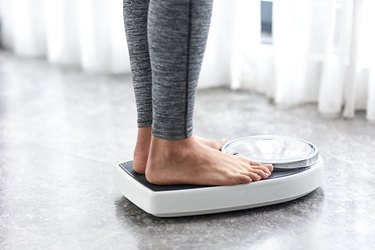
Low-carb diets typically produce noticeable weight loss during the first few weeks, in part because limiting food choices generally leads to reduced calorie intake. Several popular diets — including the Atkins and Zone diets — are based on low-carbohydrate models. However, guidelines for low-carb diets vary, depending on the program you follow. Although when you start a low carb diet, you may lose more per week initially, 2 pounds is the maximum recommended rate of weight loss after the first few weeks.
Tip
The amount of weight you lose each week on a low-carb diet depends on many factors. While you may see dramatic results during the first few weeks of your diet, much of this initial weight loss may be water weight. For good health, aim for no more than 2 pounds of weight loss a week.
Video of the Day
Features of Low-Carb Diets
Low-carb diets typically limit carbohydrate intake to 50 grams to 150 grams daily. Since each gram of carbohydrate provides 4 calories, that translates to 200 to 600 calories from carbohydrates a day. The remainder of calories, then, must come from sources of protein and fat. A report from the Harvard T.H. Chan School of Public Health explains that low-carb guidelines vary by diet, but starchy carbs, such as grains and potatoes, are generally limited.
Video of the Day
To stick to this diet, you'll need to choose mainly low-carb foods. In addition to grains and starchy vegetables, you'll want to avoid foods like dairy (milk, yogurt, cottage cheese), fruit, and legumes, while on a low-carb diet. Even though these can be healthy options, they're not low-carb foods. Other good choices for low-carb foods include meats, poultry, fish, eggs, nuts, seeds, avocado, most non-starchy vegetables, like leafy greens, broccoli, asparagus, and cauliflower.
Read more: The "Do Not Eat" List For Low Carb Diets
Weight Loss Per Week
The amount of weight you lose per week on a low-carb diet primarily depends on how your calorie consumption compares to your calorie expenditure. As with any diet, it takes a deficit of 3,500 calories to lose 1 pound of body fat. Low-carb diets are diuretic, however, which accelerates weight loss at first because you lose water as well as fat. Other benefits to reducing your carb intake include an increased sense of satiety and reduced caloric intake. Harvard T.H. Chan School of Public Health explains that because protein takes longer to digest, you generally feel full longer.
Although weight loss can vary, for most people following a low or no carb diet for two weeks will result in weight loss. Often, this is because high carb foods like sweets, chips, crackers and bread are off limits. If you have good results in the first two weeks on a no carb diet, you'll probably be motivated to continue. Eventually, those two weeks on a no carb diet can result in significant weight loss if it helps you to cut your ties with sweet and salty snacks.
Read more: The Benefits of Ketosis
Low-Carb Diet Precautions
Low-carb diets can have benefits for those with insulin resistance or diabetes, which are often related to being overweight. A January 2017 article published in the British Journal of Sports Medicine states that they tend to promote weight loss and reduce blood glucose levels, at least in the short term. However, more long-term studies are needed to see if those benefits of eating a low-carb diet outweigh any downsides to limiting carbs.
Eating low carb also means you're also eating high protein or high fat (or both). One potential downside of that is the extra strain it might put on your body. If you have kidney or liver disease or diabetes, high levels of protein can be dangerous, explains MedlinePlus. In addition, depending on your food choices, limiting carbs may result in higher intakes of cholesterol and saturated fats, which can have an unfavorable effect on cholesterol levels in the long term.
Another thing to watch out for — diets that limit carbs too much can cause dizziness, dehydration, fatigue and irritability. If you have diabetes and take insulin or other glucose-lowering medications, you also run the risk of hypoglycemia. If you have any health issues or take medications, make sure you ask your doctor if a low-carb diet for weight loss is a good choice for you.
Read more: Staying in Ketosis vs Carb Cycling
Take Into Consideration
Although low-carb diets may effectively produce weight loss, at least initially, the Harvard T.H. Chan School of Public Health reports similar results for a variety of diets that limit calories and follow heart-healthy guidelines. Ask your doctor about healthy approaches to weight loss, based on your health and nutritional needs. If you do opt for a low-carb diet, include good sources of fiber, such as fruits and nonstarchy vegetables, to avoid gastrointestinal problems and constipation.
- Harvard T.H. Chan School of Public Health: "Low-Carbohydrate Diets"
- Harvard T.H. Chan School of Public Health: "Protein: Moving Closer to Center Stage"
- Weight-Control Information Network: "Weight-Loss and Nutrition Myths"
- Centers for Disease Control and Prevention: "Losing Weight"
- MedlinePlus: "Diet: Chronic Kidney Disease"
- British Journal of Sports Medicine: "Evidence That Supports the Prescription of Low-Carbohydrate High-Fat Diets: A Narrative Review"
- StatPearls: "Low Carbohydrate Diet"